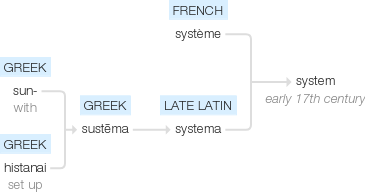System
early 17th century: from French système or late Latin systema, from Greek sustēma, from sun- ‘with’ + histanai ‘set up’.
wiktionary
From Middle French sisteme, systeme (modern French système(“system”)), or directly from its etymonLate Latin systēma(“harmony; musical scale; set of celestial objects; set of troops; system”), from Ancient Greek σύστημα(sústēma, “musical scale; organized body; whole made of several parts or members”), from σῠν-(sun-, prefix meaning ‘with, together’) + ἵστημι(hístēmi, “to stand”) (from Proto-Indo-European *steh₂-(“to stand (up)”)) + -μᾰ(-ma, suffix forming neuter nouns denoting the result of, a particular instance of, or the object of an action). The English word is cognate with Dutch systema, German System, Italian sistema, Portuguese sistema, Spanish sistema. [1]
etymonline
system (n.)
1610s, "the whole creation, the universe," from Late Latin systema "an arrangement, system," from Greek systema "organized whole, a whole compounded of parts," from stem of synistanai "to place together, organize, form in order," from syn- "together" (see syn-) + root of histanai "cause to stand," from PIE root *sta- "to stand, make or be firm."
Meaning "set of correlated principles, facts, ideas, etc." first recorded 1630s. Meaning "animal body as an organized whole, sum of the vital processes in an organism" is recorded from 1680s; hence figurative phrase to get (something) out of one's system (1900). Computer sense of "group of related programs" is recorded from 1963. All systems go (1962) is from U.S. space program. The system "prevailing social order" is from 1806.
